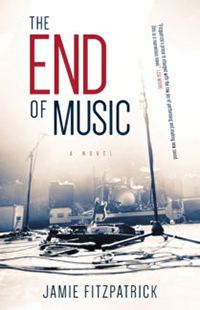Reviews
Fiction Review by Brandon McFarlane
Jamie Fitzpatrick, The End of Music (St. John's: Breakwater, 2017). Paperbound, 294 pp., $19.95.
 Jamie Fitzpatrick’s The End of Music is an accomplished experimental novel that plays with melodic irony. I confess that I am rather ignorant of music theory, but I use the term melodic irony to describe a song in which the feel of the melody contradicts the themes communicated by the lyrics and vice-versa, such as a happy sounding song with tragic lyrics or a sad sounding song with joyful lyrics. It was a common device in 1990s music which, perhaps, is best exemplified by Nirvana songs that combined upbeat punk and dance aesthetics to express otherwise depressing feelings.
Jamie Fitzpatrick’s The End of Music is an accomplished experimental novel that plays with melodic irony. I confess that I am rather ignorant of music theory, but I use the term melodic irony to describe a song in which the feel of the melody contradicts the themes communicated by the lyrics and vice-versa, such as a happy sounding song with tragic lyrics or a sad sounding song with joyful lyrics. It was a common device in 1990s music which, perhaps, is best exemplified by Nirvana songs that combined upbeat punk and dance aesthetics to express otherwise depressing feelings.
The End of Music explores the importance of paying close attention to aesthetics due to the inherent romance of live-music performance and the emergence of irony in post-World War ii art. The theme is established through two generations of musicians—Joyce and Herb Carter—and subtly developed through the novel’s double-helix narrative structure. The first plotline regards Joyce Carter, a young woman who moves from Cape St. Rose to Gander in 1952. She works at the transatlantic airport and moonlights as a musician; her story dramatizes the tensions between modernity and conservative town life in Gander. The second plotline concerns her son Herb, a washed-up indie rocker who aspires to take advantage of the lead-singer’s losing battle with cancer to release the band’s second album and other lost tracks. Both protagonists experience epiphanies when they learn how to truly listen to the hidden complexity of pop tunes.
The double-helix narrative structure juxtaposes the son’s and mother’s musical experiences, producing a harmony effect in novelistic form that expresses how the characters use and abuse music. The novel cycles through present-tense chapters about Herb’s goal to produce a new album for his old band, Infinite Yes, and past-tense chapters about Joyce in post-war Gander. For Joyce, music provides an escape from conservative town life. When the band is playing and the booze is flowing, residents of Gander can enter a world of romance, sex, and glamour that is promised by the international airport but actualized through the local party scene. Music is an all-too-important departure from the frontier marked by geographic isolation, delayed prosperity, and frequent airplane crashes. For Herb, music is an opioid that numbs his capacity for self-reflection and empathy. While indie rock provides celebrity, his extreme drive to produce great musical experiences blinkers his complicity with the misogyny of the entertainment industry. The structural comparison of the 1950s to the 2010s questions what progress has been made, especially within near-contemporary, counter-culture movements that profess progressive politics.
Themes about recovering the past echo the novel’s meditation on critically engaging with narratives. Present-day Joyce is afflicted with dementia; she resides in a seniors’ home and is at risk of being transferred to a high-security ward. She participates in a therapeutic storytelling program in which residents, mostly locals, share stories about the “good old days.” However, Joyce’s narratives upset patients and staff because they expose long-buried affairs and other immoralities from the airport’s party days. Herb’s attempt to revive Infinite Yes follows a similar pattern: as he meets with bandmates and discusses the project with fans, it is revealed that one bandmate sexually assaulted women and Herb’s abuse traumatized Leah, the lead singer. Both plotlines are juxtaposed with Herb’s emerging studies in archaeology. He contributes to the excavation of crash sites around the airport. The research team’s findings are celebrated but they reveal little about the community; in contrast, the shocking stories shared by Joyce and Herb’s female fans are repressed. The End of Music is a feminist novel because it questions selective listening, especially society’s tendency to indulge romantic, male-centric narratives while suppressing female anecdotes that question rock’s culture of sexual exploitation and harassment.
Joyce’s “star power” is perhaps the novel’s most subversive and compelling characteristic. It takes Joyce some time to appreciate the power and theatre of live music. As lead singer, she brings the fantasy of love songs to life. Herb is also aware of his band’s purpose: Infinite Yes provides a sense of romance and community to lonely teenagers and twenty-somethings. He also realizes that Leah is the primary vehicle of that experience—an insight that compels him to manically control and manipulate her. There are many electric scenes depicting Joyce’s performances, whereas descriptions of Herb’s gigs are ambiguous. The novel is bracketed by Herb chapters, superficially presenting him as the novel’s front man. However, Joyce consistently upstages her son, so to speak. Joyce is a heroine worth paying attention to, whereas Herb eventually exposes himself as an insidious misogynist who cares little for the women who love him.
The End of Music offers much to enjoy due to its fine balance of engaging storytelling and subtle aesthetic experimentation. It updates and complicates many of the “old themes” of Atlantic Canadian writing by representing Gander as a transatlantic frontier in the 1950s. It marks a notable contribution to the new wave of fiction by writers hailing from The Rock, a novel on par with early works by Lisa Moore and Michael Winter.
—Brandon McFarlane









